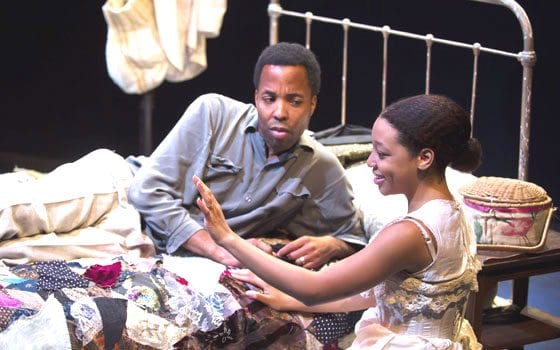
Lynn Nottage’s great-grandmother, a 1912 immigrant, made intimate apparel for African American and white women in New York.
Her experience as a seamstress intrigued the Pulitzer Prize-winning dramatist who paid tribute to her ancestor in the vivid and touching “Intimate Apparel” at the Boston University School of Fine Arts.
Nottage’s well-tailored play focuses on the fictional 1905 courtship by correspondence of Esther, a hard-working and lonely seamstress, and George, a Caribbean man working on the construction of the Panama Canal.
The play not only examines the evolution of their courtship into a troubled marriage, but also the transcendent friendship between non-Jewish Esther and a white Jewish fabric supplier called Mr. Marks.
Under Judy Braha’s direction, the revival at Boston University’s 15th annual Fall Fringe Festival sparkled as stunningly as the fancy corsets that Esther sews.
Esther — in the manner of one of the corsets she sews — holds in key information about herself in communicating with George — namely her illiteracy and the fact that her letters were written by one of her white customers and by a black friend.
The 35-year-old New York City seamstress longs for a husband and dreams of opening a beauty parlor where black women will be treated with the respect and dignity accorded to their white counterparts.
The money she has been stuffing in her bedroom quilt should help her with the latter. With the growing intimacy of the letters, George eventually arrives — and the marriage begins.
Will Esther be able to realize her dreams about marriage and work? George’s concealment proves much more damaging to those dreams than her own. At least Esther responds honestly to what she believes are the genuine sentiments of a real gentleman.
Instead, the former canal workman turns out to be an unabashed gold digger, who wastes Esther’s savings on gambling, liquor and prostitutes. What happens to an elegant silk jacket Esther has made for George hauntingly underlines the contrast between her unraveling marriage and her ever stronger friendship with Mr. Marks, her caring Jewish fabric supplier.
Marks — who has been matched up with a Jewish woman from Romania — expresses his unspoken love for Esther through sale prices for high quality silks, satins and wools and special fabric for her wedding dress. For her part, Esther signifies her feeling for Marks by finally giving him the jacket.
Throughout a play as finely detailed as Esther’s best corsets, the seamstress rises above the challenges of her disappointing marriage and very different relationships with a childless young white customer, a tenacious landlady and a vulnerable prostitute.
The quietly powerful exception — arguably the most touching aspect of “Intimate Apparel” — is the enduring connection between Esther and Marks.
Hasidic and engaged Marks may refrain from physical contact with Esther, but the intimacy of feeling between them was palpable — especially in the richly woven performances of Amber Williams as Esther and Alex Morgan as Marks.
Williams captured Esther’s frustrations and loneliness as well as her undying devotion to her dreams and her skills as a seamstress. Morgan delivered Marks’ loving exchanges with Esther with a convincing immigrant accent and fitting understatement.
He also captured the sensitivity and integrity of this beautifully written character. Keith Mascoll as George (a role otherwise played by Terrell Donnell Sledge) had the right combination of style and insincerity as Esther’s elusive spouse.
Cloteal Horne brought together the tough-mindedness and the wisdom of Esther’s landlord Mrs. Dickinson. Maxine Eloi evoked the earthiness as well as the vulnerability of Esther’s prostitute friend Mayme.
Olivia Hendrick captured the frustration and the sadness of Mrs. Van Buren, a regular customer of Esther’s. Costume designer Marian Fidalgo did full justice to the play’s striking repertoire of corsets and evening wear.
“Intimate Apparel” artfully chronicled the odyssey of one ultimately hopeful black woman at the turn of the 20th century. The loving festival revival at Boston University’s cozy Studio 210 makes her moving relationships as worthy as her needlework.






